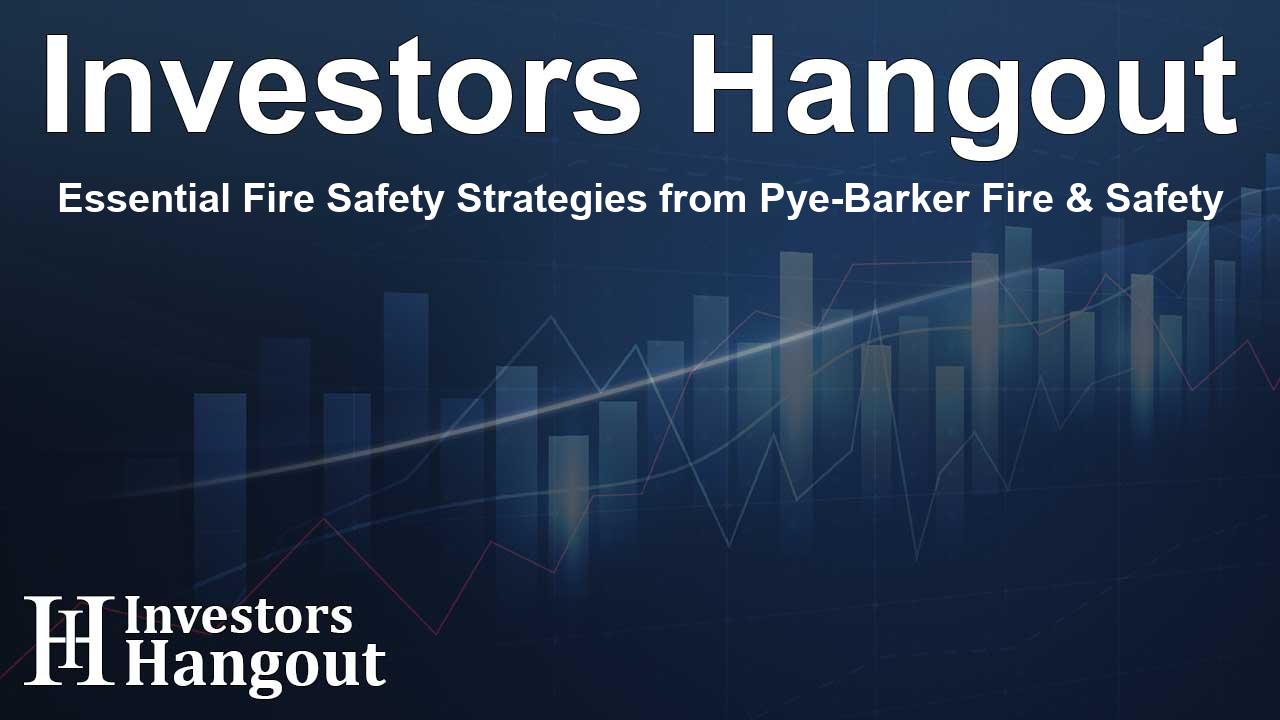Essential Fire Safety Strategies from Pye-Barker Fire & Safety

Recognizing Fire Prevention Through Awareness
Pye-Barker Fire & Safety, a prominent leader in fire protection and life safety, prioritizes proactive measures to prevent fires and safeguard lives. The importance of education and preparedness can't be overstated, especially as we observe special times dedicated to fire prevention.
Crucial Safety Recommendations for Everyone
With fire safety being an absolute necessity for both businesses and homeowners, it's essential to understand that safety begins with awareness and the right practices. At the heart of effective fire prevention lies proper education regarding fire safety measures.
Install and Maintain Detection Systems
One of the most crucial steps to ensure safety is to install and maintain proper detection systems. It is advisable to routinely check all smoke alarms every month and ensure that batteries are replaced at least annually. Each level of your home or business should have a smoke alarm installed. For added safety, consider utilizing dual-sensor monitors which provide comprehensive protection. Furthermore, carbon monoxide detectors are vital on every level, particularly near bedrooms and areas with fuel-burning appliances.
Avoiding Common Fire Hazards
Preventive measures can drastically reduce the risk of fire. Simple actions, such as keeping space heaters at least three feet away from any combustibles, can prevent flames from igniting. Overloading outlets or power strips is a common issue; thus, it's crucial to use them wisely. Regularly cleaning dryer vents can stop lint buildup that could lead to serious fires. An important habit is to blow out candles when leaving a room, as this is a common source of home fires.
Emergency Preparedness is Key
In preparing for emergencies, everyone should have the appropriate fire extinguishers accessible. According to fire safety experts, a multi-purpose ABC fire extinguisher is recommended for households, which caters to ordinary combustibles (Class A), flammable liquids (Class B), and electrical fires (Class C). Strategically placing extinguishers on every level of a home, particularly kitchens and near bedrooms, heightens safety.
Understanding Commercial Fire Extinguisher Needs
Businesses, on the other hand, should ensure that their fire extinguishment options are tailored to specific hazards present in their facilities. For instance, commercial kitchens require specific Class K extinguishers designed for cooking oils and fats. Where combustible metals are handled, Class D extinguishers are essential. Regularly testing and inspecting extinguishers and sprinkler systems is vital for compliance and safety. Pye-Barker Fire & Safety is prepared to assist companies in evaluating unique risks and suggesting the right fire protection solutions.
The Human Element in Fire Safety
Statistics reveal that approximately 80% of all workplace fires are attributed to human error. This highlights the urgent need for proper training and awareness regarding fire safety protocols. Ensuring that team members understand fire safety can lead to significant reductions in fire incidents.
About Pye-Barker Fire & Safety
Pye-Barker Fire & Safety stands as the leading provider of integrated life safety systems across the country. With a robust team comprising over 8,000 members and operations in more than 250 locations, Pye-Barker has gained recognition on esteemed lists such as the Inc. 5000 and SDM 100, ranking as No. 849 and No. 4 respectively. Committed to safeguarding lives, Pye-Barker offers comprehensive fire protection and security services, paving the way for a safer future.
Frequently Asked Questions
What should homeowners do to enhance fire safety?
To enhance fire safety, homeowners should regularly check smoke detectors, keep flammable items away from heat sources, and strategically place fire extinguishers on every level of the home.
Why is regular maintenance of fire equipment important?
Regular maintenance ensures that fire safety equipment functions reliably in emergency situations, potentially saving lives and property. Testing and inspecting these systems can help identify weaknesses before they become a problem.
How can businesses assess their specific fire risks?
Businesses can assess their specific fire risks by conducting comprehensive safety audits, engaging experts like Pye-Barker, and understanding the unique hazards present in their environments.
What types of fire extinguishers are recommended for different uses?
For homes, multi-purpose ABC extinguishers are advised, while commercial establishments may require specialized extinguishers like Class K for kitchens or Class D for metal hazards.
How can individuals prepare for a fire emergency?
Individuals can prepare for a fire emergency by developing an evacuation plan, practicing fire drills, and ensuring that all fire safety equipment is easily accessible and functional.
About The Author
Contact Olivia Taylor privately here. Or send an email with ATTN: Olivia Taylor as the subject to contact@investorshangout.com.
About Investors Hangout
Investors Hangout is a leading online stock forum for financial discussion and learning, offering a wide range of free tools and resources. It draws in traders of all levels, who exchange market knowledge, investigate trading tactics, and keep an eye on industry developments in real time. Featuring financial articles, stock message boards, quotes, charts, company profiles, and live news updates. Through cooperative learning and a wealth of informational resources, it helps users from novices creating their first portfolios to experts honing their techniques. Join Investors Hangout today: https://investorshangout.com/
The content of this article is based on factual, publicly available information and does not represent legal, financial, or investment advice. Investors Hangout does not offer financial advice, and the author is not a licensed financial advisor. Consult a qualified advisor before making any financial or investment decisions based on this article. This article should not be considered advice to purchase, sell, or hold any securities or other investments. If any of the material provided here is inaccurate, please contact us for corrections.
